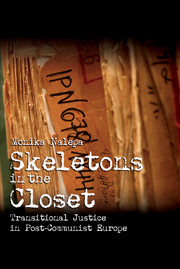Book contents
- Frontmatter
- Contents
- List of Figures
- List of Tables
- Acknowledgments
- List of East Central European Political Organizations
- 1 INTRODUCTION
- Part I Skeletons in the Closet
- Part II Out of the Closet
- 5 VOTERS
- 6 STRATEGIC ELITES
- 7 THE TRANSITIONAL JUSTICE BILL GAME
- 8 STRATEGIC TRANSITIONAL JUSTICE
- 9 EPILOGUE: BETWEEN AGENTS AND HEROES
- Appendix A Mathematical Proofs to Chapter 3
- Appendix B Answers of MPs and Their Constituents to “More Should Be Done to Punish People Who Were Responsible for the Injustices of the Communist Regime”
- Appendix C Sampling Technique and Transitional Justice Survey Questionnaire
- Appendix D Birth and Death of Parliamentary Parties by Their Position Regarding Lustration
- Appendix E Mathematical Proofs to Chapter 7
- Appendix F Lustration Laws by Target, Targeted Activity, and Sanction Type in Poland, Hungary, and the Czech Republic
- Bibliography
- Index
- Titles in the series
5 - VOTERS
TRANSITIONAL JUSTICE DEMAND
Published online by Cambridge University Press: 05 June 2012
- Frontmatter
- Contents
- List of Figures
- List of Tables
- Acknowledgments
- List of East Central European Political Organizations
- 1 INTRODUCTION
- Part I Skeletons in the Closet
- Part II Out of the Closet
- 5 VOTERS
- 6 STRATEGIC ELITES
- 7 THE TRANSITIONAL JUSTICE BILL GAME
- 8 STRATEGIC TRANSITIONAL JUSTICE
- 9 EPILOGUE: BETWEEN AGENTS AND HEROES
- Appendix A Mathematical Proofs to Chapter 3
- Appendix B Answers of MPs and Their Constituents to “More Should Be Done to Punish People Who Were Responsible for the Injustices of the Communist Regime”
- Appendix C Sampling Technique and Transitional Justice Survey Questionnaire
- Appendix D Birth and Death of Parliamentary Parties by Their Position Regarding Lustration
- Appendix E Mathematical Proofs to Chapter 7
- Appendix F Lustration Laws by Target, Targeted Activity, and Sanction Type in Poland, Hungary, and the Czech Republic
- Bibliography
- Index
- Titles in the series
Summary
In the first part of the book, I explained how the opposition party's uncertainty about the extent to which it was infiltrated delayed the passage of lustration laws – this infiltration, of course, being the skeletons in the opposition's closet. The outgoing communists successfully persuaded the opposition to resist effecting transitional justice because they convinced the opposition that lustration would reveal more collaborators among the oppositionists than among communists. In the first few years after transition, the liberal opposition that was in power refrained from harshly punishing the autocrats – at least in some countries, such as Poland, Hungary, and Slovakia.
By the mid-1990s, those countries' autocrats' honeymoon with democracy ended abruptly as lustration laws became more appealing. Figure 5.1 presents – in a different way than Table 1.1 – the timing of lustration bills in Bulgaria, the Czech Republic, Estonia, Hungary, Latvia, Lithuania, Poland, Romania, and Slovakia. The number of all bills in each country has been normalized to 100 percent and represents only the bills that passed in a given country and were not struck down by constitutional courts or vetoed by the president. Specific country columns represent the distribution of bills across three five-year periods: 1990 through 1994, 1995 through 2000, and 2001 through 2005. This enables us to distinguish early transitional justice cases from moderately delayed transitional justice as well as from severely delayed cases. The figure illustrates that only four of nine East Central European countries successfully passed lustration laws between 1989 and 1994.
- Type
- Chapter
- Information
- Skeletons in the ClosetTransitional Justice in Post-Communist Europe, pp. 99 - 125Publisher: Cambridge University PressPrint publication year: 2010
- 1
- Cited by



